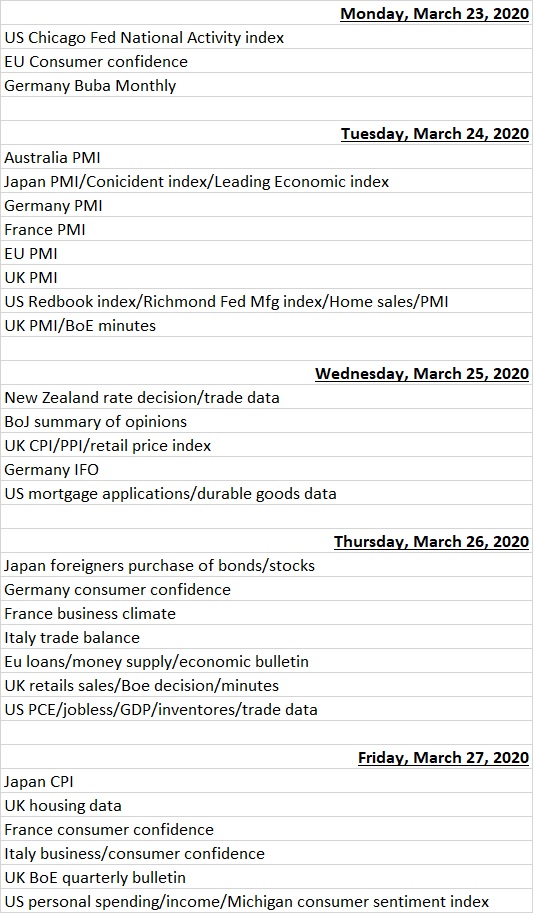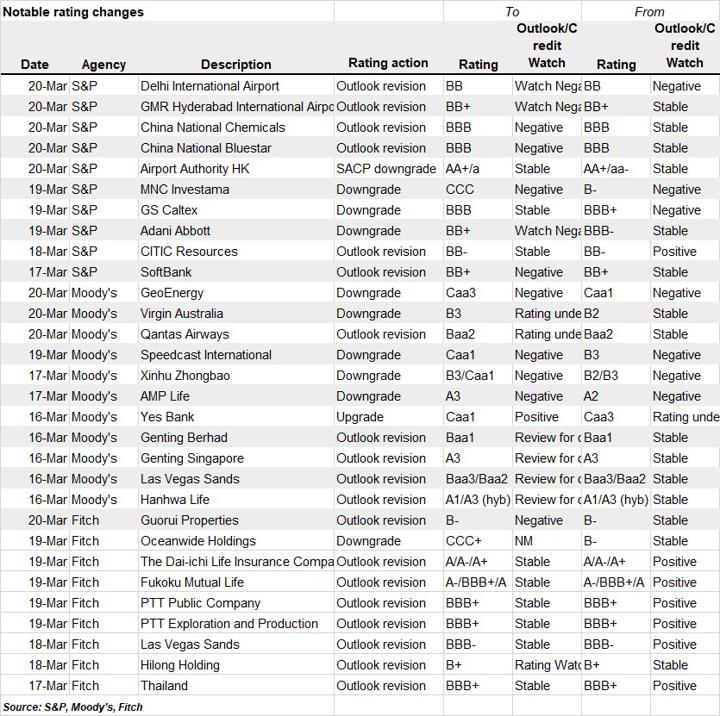(ATF) – Battered financial markets will be tested next week as more governments and central banks pledge support with the global economy hurtling towards a recession.
White House economic advisor Larry Kudlow said the US senate economic package could top $2 trillion, Germany plans an overall package worth 750 billion euros and China’s central bank said the world’s second-largest economy would fast return to potential growth and the PBOC would maintain stable credit growth. China’s central bank said there would be no change in the rates at which banks would lend to borrowers this month, signaling it has other ways of boosting credit supply.
The economic damage is already being felt by the pandemic which has claimed over 13,000 lives and infected more than 307,000 people globally.
“With the COVID-19 outbreak turning into a global pandemic, we expect a global recession,” said Barclays analysts in a note. BofA Securities said it expects global GDP growth to drop effectively to zero this year, matching the major recessions of 1982 and 2009 and Standard Chartered Bank said its central case is now a global recession in H1 and a gradual recovery in H2. Still, Martin Mühleisen, IMF’s head of Strategy, Policy, and Review Department said “this will be a temporary shock, and that the effects will not last for many months.”
The speed of the economic deterioration is manifesting itself into a dollar liquidity crisis which analysts hope will be calmed by the Fed enhancing swap lines with major central banks. Fund managers expect even more fiscal and monetary stimulus in the coming weeks and months. Pictet Asset Management said it expects the world’s central banks to inject around $2.8 trillion into the financial system, or 5% of global GDP, in 2020 which would inject liquidity to levels not seen since 2009.
“So far, the Fed has used up just over half of its recession-fighting ammunition – an estimate of some $3 trillion. We expect its balance sheet to grow to an all-time high of $7 trillion. Global fiscal measures announced so far add up to about 1% of global GDP. During 2008-2009, emergency fiscal stimulus amounted to around 2% of world output. This leaves plenty of room for further government support,” said a note from Pictet.
These measures could give some respite to markets after Wall Street last week had its worst weekly fall since 2008. On Friday Dow Jones Industrial Average fell 4.55%, the S&P 500 retreated 4.34%, and the Nasdaq Composite eased 3.79%, bringing the weekly falls to 17.3%, 15% and 12.6% respectively. The Cboe Volatility index, also called the fear gauge, dipped to 66.04 but remained elevated compared with the start of the month when it was half the current levels. VIX values greater than 30 are generally linked to a large volatility resulting from increased uncertainty, risk and investors’ fear. VIX values below 20 generally correspond to stable, stress-free periods in the markets.
Fund flows
The humongous demand for cash drove flows this week with exits of $108 billion from bond funds beating the previous record by four times the amount. “Funds with investment grade mandates bore the brunt of the latest redemptions as investors sought to liquidate holdings that have incurred the smallest losses since the coronavirus epidemic began to stampede global markets. Year-to-date, Bond Funds have posted a collective loss of under 5% compared to the over 20% decline recorded by all Equity Funds,” said EPFR Global in its weekly commentary.
Balanced and Alternative Funds also set a new weekly outflow records as investors redeemed a net $27.9 billion and $5.7 billion respectively from the two groups while $20.6 billion flowed out of Equity Funds and flows into Money Market Funds exceeded $90 billion for the second straight week, it said.
The dash for cash has pushed up yields globally, reducing the universe of negative yielding bonds down to $8.7 trillion from near $15 trillion just one week ago, according to Institute of International Finance.
The pandemic and the resultant supply chain disruptions, has triggered a rush for safe havens has bringing the total US money market assets close to $3.8 trillion-just short of the record high of $3.9 trillion in early 2009.
“This move to cash has reduced liquidity in riskier segments of the market, making price discovery-already challenging given the tremendous uncertainty around the earnings outlook-harder still,” it said in a note.
Companies in focus
Li & Fung Limited after it announced a 23% decline in operating profit and lower operating cash flow in the year to December 2019, compared with a year ago. But the retailer reported a decline in net debt and improved gearing ratio but it warned: “We expect the multi-year destocking trend in retail to continue in 2020. While innovations in the retail industry are creating more opportunities for our new services, they will also cause more disruptions for some of our customers, potentially bringing about further store closures.”
Greentown China said it had sold a a plot of land in Changping district, Beijing for 6.4 billion yuan for development into residential properties.
Lai Sun Development warned that it will post a loss in the six months to January 2020 compared with a profit of HK$5.1 billion in the same period a year ago due to fall in valuation of its investment properties and lower contribution from a joint venture project.
Economic data calendar

Rating changes last week

Umesh Desai
























